KARACHI: The Citizens Archive of Pakistan (CAP) is launching a new leg of its Exchange for Change (EFC) initiative with the city of Kolkata in an expansion of the current cycle of Exchange for Change India 2013-2015. CAP has collaborated with PeaceWorks, an initiative of The Seagull Foundation for the Arts, to launch this project this August.
Kolkata will become the seventh participant city in Exchange for Change India when the letter exchange activity kicks off this month. This leg of EFC will connect a total of 800 students in Kolkata and Karachi. Other cities that are already part of the project include Lahore, Islamabad/Rawalpindi, New Delhi, Mumbai, and Dheradun.
“Today, we welcome Kolkata into the fold of the world’s largest oral history exchange programme. There are 5,400 students already participating from six cities in the two countries, and they cannot wait to share their stories with Kolkata. The enthusiasm of the students and families associated with EFC continues to push boundaries and accomplish what many thought was unachievable between Pakistan and India,” said Swaleha Alam Shahzada, Executive Director of CAP.
“This project has possibilities of genuinely changing mindsets. The various stages it involves has possibilities of introspection at a deep level, creating a platform for the participants to not only get to know their peers across the border but also know their own identities and the history of their communities,” said Meena Megha Malhotra, Director PeaceWorks.
EFC is not only the largest oral history exchange programme, but also the largest Track 2 diplomacy programme in the world. With Kolkata on board, EFC will now connect 6,200 students from India and Pakistan through letter and postcard exchanges.
As the only student-led diplomacy initiative of its kind, EFC strives to raise understanding among students of each other’s countries, negate hateful stereotypes, and emphasise shared cultural heritage to bring peace to a troubled region.
“People to people contact is the only way forward for our countries and this project will contribute towards forging relationships and building bridges,” added Malhotra.
“We have only seen acceptance and appreciation for our programme on both sides of the border. EFC is a testament to the friendship that Pakistanis and Indians want to cultivate and sustain,” said Shahzada.
This year EFC has been expanded to reach its largest number of students ever and has furthered CAP’s goal to influence long term change in sentimentalities on both sides of the border and promote the belief that peace is possible.
Participant Schools:
Kolkata: Abhinav Bharati High School, Chowringhee High School, Lakshmipat Singhania Academy, La Martiniere for Boys, Modern High School for Girls, and Saifee Hall School
Karachi: Habib Girls’ School and Nasra School
About CAP:
The Citizens Archive of Pakistan (CAP) is a non-profit organization dedicated to cultural and historic preservation, operating in Karachi, Lahore and Islamabad. We seek to educate the community, foster an awareness of our nation’s history, and instil pride in Pakistani citizens about their heritage. Our organization has three main goals; to preserve and provide access to the archive, to build and support educational programmes, and to develop educational products based on the testimonies collected. Our vision is to develop CAP as the foremost museum and heritage centre of Pakistani history, photography, culture, literature, and historical documentation demonstrating the strength and spirit of Pakistan from the perspective of a citizen.
About PeaceWorks:
PeaceWorks — an initiative of The Seagull Foundation for the Arts — aims to strengthen values of mutual coexistence and respect for all communities. A programme which grounds itself in the arts and culture, PeaceWorks works within the area of civil society and education.
Conceived and set up in 2003 post the Gujarat riots, the broad objectives of the initiative are:
a) Address attitudes that lead to strife, intolerance, conflict, war.
b) Effect attitudes and values, in order to change thinking, break mindsets.
c) Instill values that accept differences, understand differences and respect differences.
d) Build cross-cultural bridges between young people from different socio economic backgrounds.
e) Use the arts for education and empowerment
For nearly a decade now, PeaceWorks has worked with scores of students and teachers, in India and across the border with schools in Pakistan, and lately in Kashmir, to instill the faith and the practice of ‘integration’—integration as a way of being.





